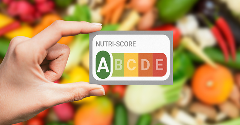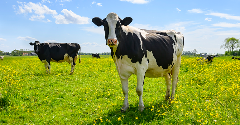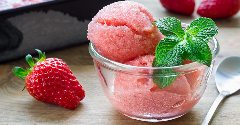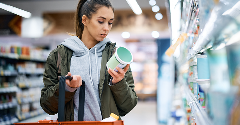News
The rise of ethical food and drink claims
13 May 2019Ethical claims on food labels are big business, accounting for more consumer spending than claims related to health and wellness, according to Euromonitor International. Covering every aspect of food production from packaging and organic production to animal welfare and workers’ rights, which are most important to consumers?
The prevalence of ethical claims related to animals, people or the environment on new food and drink products grew 47% from 2013 to 2017, according to Innova Market Insights, and animal-friendly claims are among those leading the way. The market researcher says the number of new products making a vegan claim increased by 45% a year from 2013 to 2017, driven by flexitarian consumers concerned about healthy eating, animal welfare and the impact of animal agriculture on the environment.

What is more, conscious consumers are willing to spend more on products that are produced in a more ethical manner. However, animal welfare claims only tell part of the story, as consumers have begun to expect that all products have high welfare standards, and increasingly are turning toward plant-based foods as a way to bypass the issue altogether.
Plastic waste also has become a major issue for western consumers in recent years, making recycled, recyclable, compostable or biodegradable packaging a priority for many shoppers. Euromonitor International highlighted the push for a plastic-free world among its top consumer trends for 2019.
However, there is a long way to go, as it estimates that 63% of all CPG packaging is made from plastic, often chosen for its durability and ability to keep food safe and fresh. Recycling rates are often low, and much of the plastic packaging that is recycled was – until recently – shipped to China for processing. After China decided to end this trade in 2018, many western countries have been prompted to look again at their recycling policies.
Meanwhile, Euromonitor has found that the proportion of people who are willing to pay more for eco-friendly food has risen over the past two years, as has the proportion of those who feel that recyclable packaging influences which beverage they choose.
Although plastic waste and animal welfare are hot-button areas of concern, organic is still a claim that a lot of consumers trust, with many believing that an organic label covers much more than agricultural production methods. European sales of organic food and drink increased by 48% from 2012 to 2016, with Germany and France leading the market, according to FiBL figures. For European consumers, organic certification touches on animal welfare and the drive toward better environmental practices, and 72% also associate it with better quality, while 70% believe organic food is safer.
Whichever claims manufacturers choose to use on product packaging, suppliers increasingly are coming together to ensure that specific ingredients are ethically sourced. For example, Corbion recently signed on to the North American Sustainable Palm Oil Network (NASPON), which includes other big suppliers like Barry Callebaut, Blommer Chocolate Company, Bunge, International Flavors & Fragrances, and IOI Loders Croklaan. The aim is to help North American companies deliver on commitments to source sustainable palm oil.
Similar collaborative projects are underway to improve supply chains for other commodity ingredients, such as cocoa and coffee.
Related news

Danone removes NutriScore from products
20 Sep 2024
Following an algorithm update that gives some of its sweetened drinks a worse score, Danone has removed the front-of-pack label, NutriScore, from all of its products – putting profit before public health, say campaigners.
Read more
Diestel is first turkey producer to snag Regenifed certification
17 Sep 2024
In the US, Diestel Family Ranch, a family-owned turkey farming venture, has become the first producer to gain Regenified certification for its whole turkey and processed turkey product ranges.
Read more
Indonesia introduces new halal certification system
9 Sep 2024
International food and beverage companies importing halal products into Indonesia need to adhere to new rules after the country introduced a new halal certification system.
Read more
Tesco trials methane mitigation supplement for dairy cattle
5 Sep 2024
Tesco is trialing a methane-reducing feed supplement for one of its key UK dairy farms, sustainable UK milk producer Grosvenor Farms.
Read more
USDA launches new nutrition hub network
22 Aug 2024
The United States Department of Agriculture (USDA) will invest $4.5 million into providing nutritional advice and guidance across the US.
Read more
Better Juice expands its range to sorbets
16 Aug 2024
Food tech startup Better Juice has developed a technology to reduce the sugar content in fruit sorbets. The process retains the natural vitamins, minerals, and flavours of fruit, while offering manufacturers an easy-to-implement and scalable solution t...
Read more
Sweden updates front-of-pack Keyhole labelling rules
11 Jul 2024
The Swedish Food Agency has announced updates to the voluntary Keyhole logo, used in four Nordic countries, following recommendations to improve nutrition labelling.
Read more
The seed oil backlash: How food and beverage brands are adapting
9 Jul 2024
There is a small but growing anti-seed oil movement, with some consumers perceiving seed oils – such as rapeseed oil and sunflower oil – as harmful for human health, despite the advice of nutritionists and assurances from dietary authorities.
Read more
Tesco launches laser-etched avocados to reduce plastic packaging
3 Jul 2024
UK supermarket chain Tesco is trialing a new laser-etched avocado range as part of its measures to cut down on plastic packaging and enhance its environmental profile.
Read more
Researchers tap into sticky rice as a potential source of clean label starch
8 May 2024
Pigmented waxy rice may prove to be a good source of clean label starch, according to researchers at the University of Arkansas.
Read more


